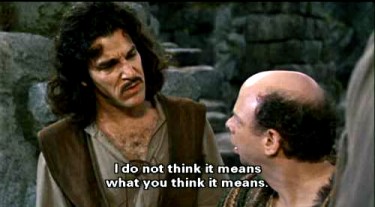
Credit: Wikimedia Commons
There are a lot of productivity myths. For instance, early birds are more productive, structure kills creativity, adding resources increases output, and more. Although well intentioned, these are all wrong.
So what works? What productivity hypotheses have been tested and proven by science? After sifting through dozens of top search results, reports, and studies, this is what I found. The most convincing, substantiated, and established productivity strategies: Continue reading…

“The Princess Bride” 20th Century Fox
As a writer, I sometimes get reader mail.
Most of it relates to typos. Some of it relates to disagreement or additional viewpoints. On occasion, I even get fan mail—how lovely.
As for typo-related mail, most of that is really nice. “Hey, Blake. Enjoyed your story on [insert popular story here]. Noticed a typo, however, and thought I’d share.”
Some of it gives me the benefit of the doubt. “Hi, Blake. Perhaps your spellcheck mistakenly changed ‘espoused’ to ‘expelled’?”
“No, kind reader,” I’ll reply. “My bad diction stuck again. Thanks for keeping me honest.”
Still, some of the mail I receive is unforgiving. As if my mistakes should disbar me from contributing to mainstream media. As if I should master English before using it to articulate a point, tell a story, answer a question, or inspire change. Continue reading…
 While on vacation this summer, my family stayed at a Hampton Inn in Gallup, New Mexico.
While on vacation this summer, my family stayed at a Hampton Inn in Gallup, New Mexico.
At breakfast the following day, my five year old daughter couldn’t stop gawking at an under-clothed woman seated at the table next to us. “Why is that lady showing her belly?” she loudly inquired. A little embarrassed, Lindsey and I told her to stop starring and eat her breakfast.
Admittedly, I think everyone in the room was a little uncomfortable and probably judgmental. But for the most part, everyone carried on and we had an enjoyable breakfast.
As we were finishing up, the lady approached our table. Looking at Lindsey and I with a gentle smile, she said, “You have a beautiful family.” She then turned and offered the same smile to each of our four children. It was the nicest compliment and gesture anyone has paid to me all summer, if not all year.
So thank you lady from the Hampton Inn in Gallup, New Mexico. Thank you for your unexpected example of kindness, friendship, and reminding my family never to judge a book by its cover.
Originally published on October 26, 2012
 Via Business Insider:
Via Business Insider:
How can we stop such trends toward dishonesty (in this case, broader acceptance of illegal downloading)? The problem is that if someone has acquired 97% of their music illegally, why would they legally buy the next 1%? Would they do it in order to be 4% legal? It turns out that we view ourselves categorically as either good or bad, and moving from being 3% legal to being 4% legal is not a very compelling motivation.
This is where confession and amnesty can come into play. What we find in our experiments is that once we start thinking of ourselves as polluted, there is not much incentive to behave well, and the trip down the slippery slope is likely. This is the bad news. The good news is that in such cases, confession, where we articulate what we have done wrong, is an incredibly effective mechanism for resetting our moral compass.
First published November 5, 2012

wikimedia commons
Humans are more distracted now than ever before, at least since we’ve started keeping records. Over the last decade, the average attention span has dwindled from 12 seconds in 2000 to just eight seconds in 2014, according to the U.S. Library of Medicine. The kicker: our eight second attention spans are one second shorter than a goldfish’s. No joke.
Who or what’s to blame for such abhorrent focus? “External stimulation,” says the Library of Medicine. That’s code for mobile internet, apps that vie for our attention, push email, social media alerts, work from anywhere, persistent connectivity, and our enthusiastic adoption of “the internet of things.” In other words, the only person we can blame is ourselves.
What’s a working professional to do then? You have three options, according to popular thinking: fall off the grid, stick with default technology settings for substandard productivity, or my personal favorite, set usage boundaries to upgrade concentration, contributions, and welfare levels.
For those interested in options one or two, this article won’t be any help. But for for those interested in the latter, there’s quite a lot you can do to stay focused in a 24/7 world. After extensive online research, here is the most celebrated and pragmatic advice for doing just that: Continue reading…

I was solicited for a job at Google last month by their HR department. I turned them down. Here’s why: Continue reading…

Michael Balint
The following people are giants in my eyes. Without their supportive shoulders and encouraging spirit, I would be at a disadvantage: Continue reading…

credit: blake snow
Life is hard sometimes. It’s always hard if you do any of the following with regularity: Continue reading…
[youtube]http://www.youtube.com/watch?v=d6wRkzCW5qI[/youtube]
This two minute video by Matthew Belinkie is as good today as it was when I first shared it eight years ago.
Content marketing has been around for centuries—ever since the first newspaper figured out they could sell ad space against stories that interested people. But it wasn’t until the last few years—even after mostly failed corporate blogging efforts—that content marketing has become a staple of modern marketing budgets in the social media age.
Consequently, commercial brands, communication departments, and Fortune 500 marketing arms are hiring former journalists, editors, and content strategists at an astonishing rate. One well-known software maker I consult for even has a bona fide news department. The place bustles like the New York Times newsroom. Their editorial content is generating executive interest and finding traction with online audiences.
That said, we’re still in the wild west of content marketing. Here are 10 ways to lay claim on the new frontier. Continue reading…

SNL
I recently sampled a book in which the author said such-and-such was the “second most enchanting thing” he’d ever seen, save only seeing his wife for the first time. The line made me reflect upon the first time I met my wife:
In a hot tub. Continue reading…
 For the next month, soccer fans watching the World Cup will see more fake injuries than any amount of magic spray could possibly cure. And by fake I mean diving, flopping, conniving—temporarily feigning injury in an effort to draw an advantageous ruling on the field.
For the next month, soccer fans watching the World Cup will see more fake injuries than any amount of magic spray could possibly cure. And by fake I mean diving, flopping, conniving—temporarily feigning injury in an effort to draw an advantageous ruling on the field.
Although seen in international soccer with regularity, diving during the World Cup happens in greater frequency because the stakes are higher. (This is the world championship, after all, held once every four years.) And when the stakes are higher, cowardice teams will employ anything they can for an edge.
“In the British game, it is often seen as an import from foreign players,” says psychologist Paul Morris, who studies diving at the University of Portsmouth. “Many people argue that it has been common in Italian football for decades.” Continue reading…

A client recently asked for links to some of my favorite personal writings. This is what I sent him:
Photo credit: Sara Snow

Courtesy Shutterstock
I have found, as many before me, that with age comes added responsibility and a much larger to-do list. I’m arguably busier than I’ve ever been in my life with managing a marriage, a new baby, a company, and working on several other projects. Opportunity surrounds us, and I want to take it all in. I hope to learn, experience, and do as much as I can (or even can’t sometimes) throughout my life. I thoroughly enjoy meeting new people, learning new things, and finding other ways of applying the little that I know.
While pondering all of this on my way to Salt Lake City this morning and after catching myself saying “I’m so busy,” to those around me, I couldn’t help but think how this claim might sound to the receiver. Does that phrase add any value to the person listening? Does that make them feel important? If it doesn’t, then do away with it. Continue reading…
What do all those silly corporate titles really mean? Let’s find out.
According to Wikipedia, the Chairman (of the board) is pretty much the top dog. He elects the CEO and President who then elect the rest of the down line. The Chairman and the rest of the board are more concerned with governance while the CEO and President are more concerned with management. The distinction between governance and management allows for clear lines of authority with the aim being to prevent a conflict of interest and too much power being concentrated in the hands of one person.
The President can also be known as COO or chief operating officer, taking care of the day-to-day operations of the company while the CEO is more concerned with strategic management. The President or COO report directly to the CEO, and the CEO to the board.
These titles are generally used for large, public corporations, while partners (chair persons) and directors (managers) are typically used for smaller, private firms. There you have it.
Originally published Oct 21, 2005
A message—whether an email, voice-mail, sticky note, or blog post—is just a mini presentation. It’s a way of conveying information to an audience. To effectively do so, I try to adhere to the following 3 principles.
-
Be brief. Say what you need to say and nothing more. Keeping it simple will allow your audience to understand and remember what you want them to.
-
Be detailed. In what you do choose to say, tell the audience specifically what they need to know, including quantities, hard deadlines, and delivery.
-
Have structure. Write, record, annotate, say, or outline your message in an organized manner, so there is no confusion.
If you are brief, detailed, and structured when conveying information to an audience, your message will be loud and clear. Just be sure you have something important to say…



 While on vacation this summer, my family stayed at a Hampton Inn in Gallup, New Mexico.
While on vacation this summer, my family stayed at a Hampton Inn in Gallup, New Mexico. Via
Via 





 For the next month, soccer fans watching the World Cup will see more fake injuries than any amount of
For the next month, soccer fans watching the World Cup will see more fake injuries than any amount of 
